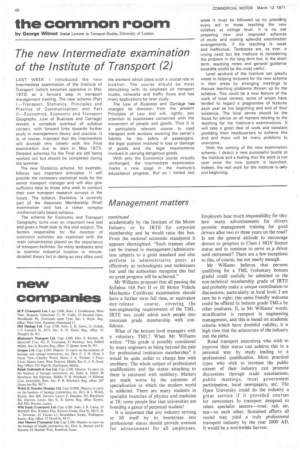the common room
Page 50

If you've noticed an error in this article please click here to report it so we can fix it.
by George Wilmot Senior Lecturer in Transport Studies, University of London.
The new Intermediate examination of the Institute of Transport (2)
LAST WEEK I introduced the new Intermediate examination of the Institute of Transport (which becomes operative in May 1972) as a forward step in transport management training, The new scheme (Part I Transport, Statistics, Principles and Practice of Communication; and Part II--Economics, Economic and Transport Geography, Law of Business and Carriage) reveals a complete overhaul of syllabus content, with forward links towards further study in management theory and practice. It is, of course, intended that the Intermediate will dovetail very closely with the Final examination due to start in May 1973. Detailed schemes for the Final are still being worked out but should be completed during the summer.
The new Statistics scheme, for example, follows two important principles. It will provide the necessary statistical tools for the senior transport manager and will also give sufficient data to those who wish to conduct their own transport research surveys in the future. The subject, Statistics, is currently part of the Associate Membership "final) examination and has a rather complex mathematically based syllabus.
The scheme for Economic and Transport Geography turns over an important new leaf and gives a fresh look to this vital subject. The factors responsible for the location of economic activities are examined with the main concentration placed on the importance of transport facilities. So many textbooks tend to examine industrial location in minute, detailed theory but in doing so very often omit the element which plays such a crucial. role in location. The course should be most stimulating with its emphasis on transport routes, networks and traffic flows and has many applications for later study.
The Law of Business and Carriage he changed its direction from the present Principles of Law and will, rightly, pay attention to businesses concerned with the movement of people and goods. Thus it is a particularly relevant course to road transport with sections covering the carrier's liability for the safety of passengers, the legal position involved in loss or damage of goods and the legal requirements involved in carrying dangerous goods.
With only the Economics course virtually unchanged, the Intermediate examination marks a new stage in the Institute's educational progress. But as I hinted last week it must be followed up by providing every aid to those teaching the new syllabus at college level. It is no use preparing new and improved schemes of study and making splendid examination arrangements, if the teaching is weak and ineffectual. Textbooks are, as ever, a crying need but the Institute is considering the problem in the long term but, in the short term, teaching notes and general guidance booklets. would be the most useful.
Local section's of the Institute can greatly assist in helping lecturers for the new scheme in their areas by arranging meetings to discuss teaching problems thrown up by the syllabus. This could be a new feature of the work of local centres, some of whom have tended to regard a programme of lectures each year as the beginning and end of their existence. The local centre should be the focus for advice on all matters relating to the teaching for the Institute's examinations. It will take a great deal of work and constant prodding from headquarters to achieve this end and there will be many problems to overcome.
With the coming of the new examination scheme, I detect a new purposeful bustle at the Institute and a feeling that the work is not over once the new system is launched. Indeed, the real work for the Institute is orily just beginning.






















































































